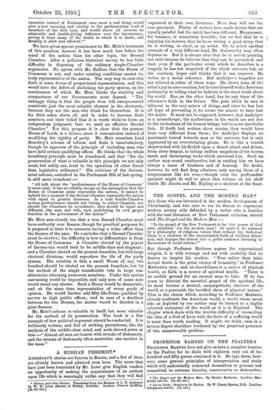A RUSSIAN PESSIMIST.*
ANDukv-Ev's stories are famous in Russia, and a few of them are already known and admired even here. The score that have just been translated by Mr. Lowe give English readers an opportunity of making the acquaintance of an outlook upon life which is amazingly unlike any that they will find
• Silence, and other Stories. Translated from the Russian of L. N. Andreyev by W. H. Lowe (Rector of Brialey, Norfolk). London : Francis erialths. Ps. &I. net.]
expressed in their own literature. Here they will see the true pessimist. Plenty of writers have made stories that are equally painful, but the spirit has been different. Maupassant, for instance, is sometimes horrible ; but we feel that he is enjoying his horrors, that he loves telling a good story, that he is writing, in short, as an artist. Or, to select another example of a very different kind, Mr. Galsworthy may often depress us. But it is always clear that he is merely pointing out evils because he believes that they can be prevented, and that, even if the particular event which he describes is a tragedy, he has not despaired of the whole universe, but, on the contrary, hopes and thinks that it can improve. He writes as a social reformer. But Andreyev's tragedies are not relieved in either of these ways. He shows none of the artist's joy in mere creation, but devotes himself with a ferocious pertinacity to telling what he believes is the exact truth about the world. Nor, on the other band, has he any trace of the- reformer's faith in the future. The pain which he sees is inherent in the very nature of things, and since he has lost all hope of preventing it, he seems too almost to have lost the desire. It must not be supposed, however, that Andreyev is a misanthrope ; the misfortunes in his world are not due to the wickedness of his human beings, but to some inevitable fate. If Swift had written short stories, they would have been very different from these ; for Andreyev displays no• passionate hatred towards man or the universe, but is only oppressed by an overwhelming gloom. He is like a tourist shipwrecked with his Kodak upon a desert island, and driven, from sheer despair, to taking endless snapshots of the barren sands and threatening rocks which surround him. Such an author may sound unattractive, but in reading him we have always a sense of kindness and of honesty. No doubt,. however, he will find deep admirers only among those of a temperament like his own,—though even the profoundest optimist might do well to place this volume on his shelf beside Mr. Jacobs and Mr. Kipling as a skeleton at the feast..














































 Previous page
Previous page